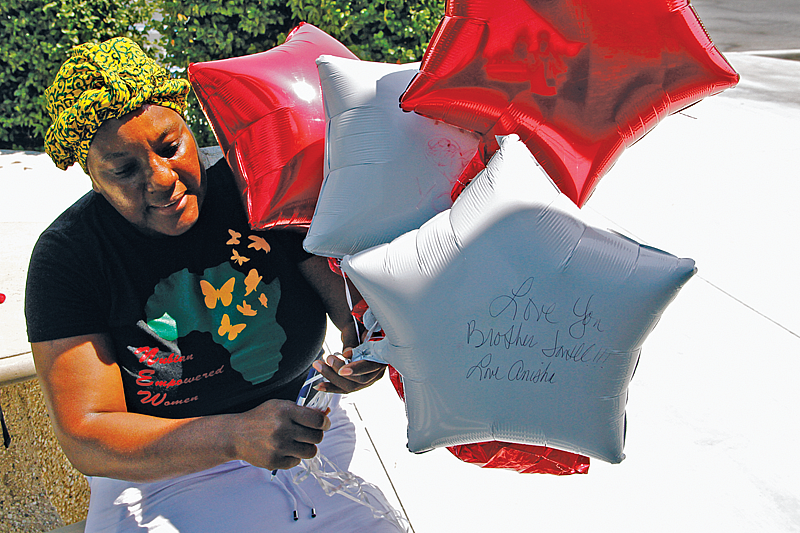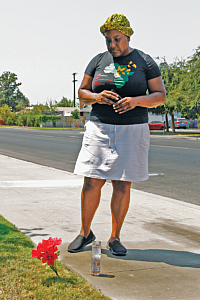Tulare mother calls for better PD training on mental health
This article was produced as a project for the USC Annenberg Center for Health Journalism’s 2018 California Fellowship.
Other stories in this series include:

Photo by Paul Myers.
The tragedy that struck the heart of one Tulare family on March 12, 2018 could be construed as another racially charged officer involved shooting, but the events of that day go deeper than skin color.
Obscure reports say a young black man was in a confrontation with a local bus driver at the intersection of Cherry and Cross in Tulare. The description was similar enough to 27-year-old Jontell Reedom that when police responded they chose to speak to him. One passerby captured the violent exchange between two Tulare police officers and Jontell on video.
Viewers saw in the final moments of Jontell’s life, him jogging away from the two police officers that are currently left unnamed by the police department. When one officer came within a close distance they attempted to subdue him with their Taser. When Jontell continued to try and elude the officers the confrontation led to blows for a brief moment before crossing the street to the First Baptist Church.
Because of the obstructed view from passing cars, distance and video quality it is unclear what transpired between the officers and Jontell. But one of the officers seconds later fired eight rounds, eventually killing him.
At the same time the national conversation was focused on police officers responding to black suspects with deadly force at disproportionate rates. Some castigated the Tulare Police Department for what appeared to be another deadly shooting between the police and a black man until Jontell’s mom, Anyka Harris, addressed the Tulare City Council after the shooting and explained her son suffered from schizophrenia.
“We have some great police officers but what are we going to do about the issue of how they interact with mental health patients?” Harris said at the March 20 Tulare City Council meeting. “When are they going to get their training? Because they need it, and they need it now before someone else like my son is brutally murdered – executed!”
As a part of police academy curriculum candidates take a required course preparing them for potential mental health situations. However, once offers graduate there is no explicit requirement they take for additional mental health training. Active members of law enforcement, and in particular patrol officers, can theoretically go their entire career without taking any updated or additional mental health courses. Only compounding the issue, scheduling conflicts and other required obligations make it difficult for some police departments to find the time to send officers to update their training at all.
“I’m hoping you guys are working on whatever budget you need to, to get [officers mental health training],” Harris added in her address to the Tulare City Council. “I’m hoping you guys are working on whatever you need to get [officers] to whatever people or organizations to train them, so they know how to interact and de-escalate when they come in contact with someone who has mental illness.”
Photo by Paul Myers.
Months after the shooting Harris regularly releases helium balloons with loving hand written messages on them addressed to Jontell. While some may only have known Jontell through the brief video, Harris remembers her son as a talented and loving young man who went on to struggle with a terrible illness.
Harris says Jontell grew up a well-known character around Tulare, in part because of his natural athletic ability on the football field. Over three varsity seasons with the Tulare Union Redskins, Jontell rushed for 5,656 yards and 79 total touchdowns; 43 were in his senior year alone in 2008. His hardnosed performances every Friday night played a pivotal role in their undefeated, Valley Championship winning, season. And by the end Tulare Union High School was ranked the 400th best program in the country and 45th best in California.
“Football was his love. His life revolved around football…He was one of the hardest players to take down. It would take five or six players sometimes to get him down and sometimes he would drag them along the field,” Harris said.
Two years after graduating high school in 2009, Harris noticed Jontell’s normally carefree and jovial personality retreat into silence and loneliness. She said at first she did not recognize it as mental illness. Before long Jontell was saying hurtful things to his family that he normally showed love and affection toward. Then he began responding to voices he could hear in his head. In 2011 Jontell was officially diagnosed with schizophrenia.
“He loved joking around and making us laugh,” Harris said. “Once he was ill, he stayed a lot to himself and stayed quiet. But he didn’t cause trouble. He didn’t bother people.”
After being diagnosed Jontell was prescribed a bevy of medications. Harris says the medication helped remedy the voices he would hear, but they also made him feel restless and it was hard for him to sit still for extended periods of time. Harris says he would choose to walk wherever he needed to go, even several places in the same day. Fortunately Jontell had his live-in grandmother Aileen, Harris’ mother, to convince him to take his medication. According to Harris, Jontell and her mom had a close relationship.
“That was really her baby. I just birthed him. I will tell you that. Anyone else will tell you that. I mean they were inseparable,” Harris said.
However, Jontell’s grandmother passed away in 2016 and Harris took on the primary role of making sure he continued taking his medication. But when she moved to Sacramento in March of 2017 Jontell did not want to move with her. Jontell’s cousin helped arrange temporary housing at an independent living facility in Visalia. Unfortunately there was nobody to consistently check that he was taking his medication every day. Although, while he was there Harris would make contact with Jontell mostly through phone calls and a once a month visits as transportation allowed because she did not have a personal vehicle at the time. But he eventually walked out of the facility in July 2017.
When he left the facility Jontell asked to move in with Harris, but because of particular restrictions and hang-ups with paperwork he was forced to stay in Tulare. Once she purchased a car Harris visited Jontell at least twice a month and helped him settle into a second living facility because he was not eligible to return to the first. He walked out of the second facility a month later forcing him to live with family and friends for almost three months.
“Things started to go downhill from there,” Harris said.
By October of last year Harris was able to help Jontell get his own apartment. She continued to check in with him every month and over the phone but there was still no assurance he was taking his medication consistently. Then on March 12 she got the call that Jontell was shot and killed by Tulare police officers.
“I was actually at my youngest son’s basketball tournament in Vegas, and I was going to be coming here to check on him the next day,” Harris said. “When I heard, I was like, ‘no.’ This is something I had feared since July of last year.”

